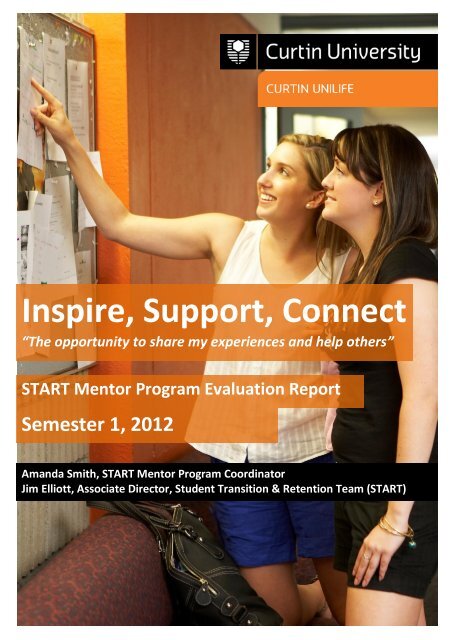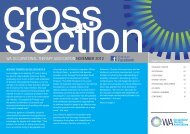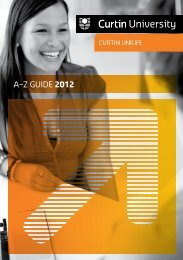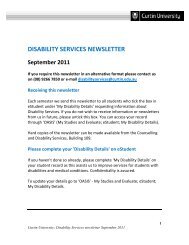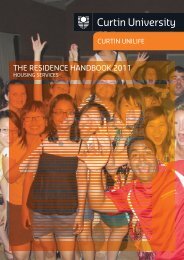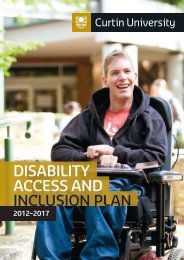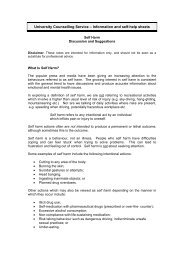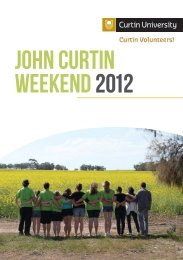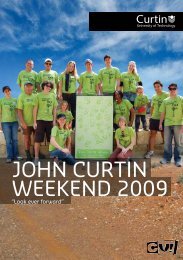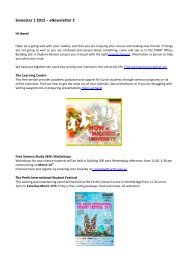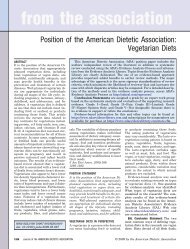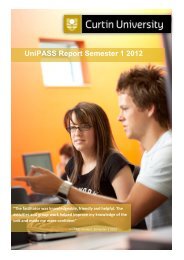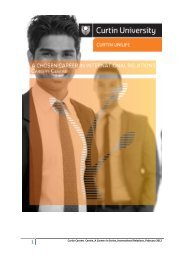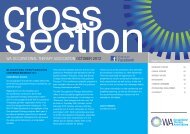2012 S1 Mentor Program Report - Unilife - Curtin University
2012 S1 Mentor Program Report - Unilife - Curtin University
2012 S1 Mentor Program Report - Unilife - Curtin University
You also want an ePaper? Increase the reach of your titles
YUMPU automatically turns print PDFs into web optimized ePapers that Google loves.
Inspire, Support, Connect<br />
“The opportunity to share my experiences and help others”<br />
START <strong>Mentor</strong> <strong>Program</strong> Evaluation <strong>Report</strong><br />
Semester 1, <strong>2012</strong><br />
Amanda Smith, START <strong>Mentor</strong> <strong>Program</strong> Coordinator<br />
Jim Elliott, Associate Director, Student Transition & Retention Team (START)
START <strong>Mentor</strong> <strong>Program</strong><br />
mentoring.curtin.edu.au<br />
START <strong>Mentor</strong> <strong>Program</strong> Evaluation <strong>Report</strong> Semester 1, <strong>2012</strong><br />
Contents:<br />
Executive Summary ............................................................................................................................................. 2<br />
Acknowledgements ............................................................................................................................................. 3<br />
Introduction ........................................................................................................................................................ 4<br />
Feedback from Mentees...................................................................................................................................... 4<br />
The impact of the <strong>Mentor</strong>s on Mentees’ decisions to persist at <strong>Curtin</strong> .............................................................. 4<br />
Mentee ratings of <strong>Mentor</strong> impact: Effect on the First Year Experience ............................................................. 5<br />
Qualitative Data from Mentees: Positive Aspects of the <strong>Mentor</strong> <strong>Program</strong> and Suggestions for Improvement ... 8<br />
Outstanding <strong>Mentor</strong> Nominations ....................................................................................................................... 9<br />
Feedback from <strong>Mentor</strong>s .....................................................................................................................................10<br />
<strong>Mentor</strong> <strong>Program</strong> Updates for <strong>2012</strong> ....................................................................................................................13<br />
A Reputation as a Leader in the Field..................................................................................................................14<br />
Conclusions and Recommendations for the 2013 <strong>Mentor</strong> <strong>Program</strong> ....................................................................14<br />
Additional Documentation .................................................................................................................................15<br />
Executive Summary<br />
“The opportunity to share my experiences and help others.”<br />
(<strong>Mentor</strong>, Sem 1, <strong>2012</strong>, describing the benefits of being a mentor)<br />
The START <strong>Mentor</strong> <strong>Program</strong> was introduced from 2008 as a key strategy to improve student retention. In 2011<br />
the program was expanded across all Faculties at <strong>Curtin</strong> <strong>University</strong> Bentley campus and currently, almost every<br />
new first year undergraduate student in their first semester at the <strong>Curtin</strong> Bentley campus has access to a<br />
student mentor. <strong>2012</strong> is therefore the first year that across the whole campus, mentors have been drawn from<br />
students who may have been mentees. This may have had an impact on the high numbers of Outstanding<br />
<strong>Mentor</strong> nominations and evaluation responses – more staff and students understand or have had some<br />
experience with the mentor program.<br />
Consistent evaluation data since 2008 from mentors, mentees and coordinating staff in the participating areas<br />
affirm that the program not only meets its retention goals but also significantly improves the student experience<br />
for all participants. It also enhances the sense of community within teaching schools, assists academic staff and<br />
contributes strongly to the <strong>University</strong>’s reputation nationally and internationally.<br />
The abovementioned evaluation data is obtained from both Mentees and <strong>Mentor</strong>s. Mentees are asked a<br />
question specifically relating to attrition and retention - “Were you at any point considering withdrawing from<br />
<strong>Curtin</strong>?” and, “If yes, did your <strong>Mentor</strong> make any difference to your decision to continue at <strong>Curtin</strong>?” A total of<br />
14% of the total mentees surveyed indicated that they had indeed considered withdrawing. Of those who had<br />
considered withdrawing, 16% responded that their mentor had helped either a small amount, significantly, or<br />
been essential in their decision to continue their studies. It is this measure which clearly demonstrates the<br />
effect of the program on student retention.<br />
Other feedback data from Mentees (regardless of any risk of attrition) indicated that they valued the program<br />
highly, and that it has a positive impact on the First Year student experience. For example:<br />
L:\PER\VC\Shared\OUA\CCL\Start\001<strong>Mentor</strong> Schemes and Training\Evaluations Forms Data and <strong>Report</strong>s\<strong>2012</strong> <strong>Mentor</strong> <strong>Program</strong> Evaluation\<strong>2012</strong> <strong>S1</strong> <strong>Mentor</strong> <strong>Program</strong> <strong>Report</strong>.docx Page 2 of 15
START <strong>Mentor</strong> <strong>Program</strong><br />
mentoring.curtin.edu.au<br />
“...I don't think I would have made it through this semester without (my mentor’s) guidance.”<br />
“(My mentor) ... made me feel warmly welcomed at <strong>Curtin</strong>.”<br />
<strong>Mentor</strong> feedback is also positive – these students clearly understand the worth of the skills learned through the<br />
mentoring experience and value the opportunity to provide support to their fellow students and contribute to a<br />
sense of community within their School.<br />
“I have made new contacts and I believe I have developed skills that I can use in both my career and everyday<br />
life.”<br />
“I have learnt so much myself about <strong>Curtin</strong>, but also the good feeling you get from realising how much you can<br />
help others.”<br />
The success of the undergraduate program has clearly contrasted with the lack of mentor support for<br />
postgraduate students, and this is being addressed in 2013, with the implementation of a Postgraduate <strong>Mentor</strong><br />
<strong>Program</strong> run through the Student Guild using SSAF funds. START staff have been assisting and will continue to<br />
offer guidance and support to the Guild as they commence this program.<br />
The recommendations deriving from <strong>Mentor</strong> and Mentee evaluations and School feedback for 2013 are<br />
summarized below:<br />
<br />
<br />
<br />
<br />
<br />
<br />
Maintain flexibility with regard to how the program is implemented within each School/Area, and as to<br />
how much support to provide each individual School.<br />
Continue to update training to better respond to mentor needs, including the expansion of the specific<br />
training information provided to online/external mentors.<br />
Inclusion of the <strong>Mentor</strong> <strong>Program</strong> as an aspect of a First Year experience policy if and when such a policy<br />
is developed.<br />
Continued strong emphasis on the role of <strong>Mentor</strong>s in the School Orientation Week activities.<br />
Expanded advertising strategies to raise awareness of the program and expectations to respond to<br />
mentors amongst new first year students.<br />
Explore the potential in utlizing StarFish Retention software to better manage the administration of the<br />
mentor program.<br />
Acknowledgements<br />
The efforts of the student <strong>Mentor</strong>s are gratefully acknowledged. Without their enthusiastic involvement, there<br />
is no <strong>Mentor</strong> program at all. We also acknowledge the involvement of staff members in each participating<br />
School and Faculty for Semester One <strong>2012</strong>. They include:<br />
Emma Riley, Adrian Paxman, Susan Reys, Nicole Wilton, Pamela McRorie, Julie Robertson, Courtney MacKenzie,<br />
Kirrily Manning, Christina Fernandes, Oksana Burford, Renee McLennan, Trudi Fischer, Natalie Gasson, Jade<br />
Cartwright, Ann Firth, Ranil Coorey, Kerryn Butler-Henderson, Linda Portsmouth, Melanie Griffiths, Krassi<br />
Rumchev, Andrea Begley, Lara MackIntosh, Robert Lopez, Susan Beltman, Glen Hutchings, Joyce Bell, Nicole<br />
Slatter, Paul Lowndes, Jackie Raphael, Stephanie Hampson, Kelsey Giambazi, Qian (Nicole)Gong, Jake Schapper,<br />
Shahed Khan, Leslie Almberg, Mike Robey, Garry Leadbeater, Deborah Fukuyama, Christian Dupuis, Mary<br />
Thompson, Jane Sneesby, Kevin Bowman, Yarra Korczynskyj, Robert Loss, Curtise Ng and Tom Schut.<br />
L:\PER\VC\Shared\OUA\CCL\Start\001<strong>Mentor</strong> Schemes and Training\Evaluations Forms Data and <strong>Report</strong>s\<strong>2012</strong> <strong>Mentor</strong> <strong>Program</strong> Evaluation\<strong>2012</strong> <strong>S1</strong> <strong>Mentor</strong> <strong>Program</strong> <strong>Report</strong>.docx Page 3 of 15
START <strong>Mentor</strong> <strong>Program</strong><br />
mentoring.curtin.edu.au<br />
Introduction<br />
There are currently approximately 20 different Schools and areas that have a mentor program - mainly at course<br />
level (apart from the faculty wide program in <strong>Curtin</strong> Business School and Centre for Aboriginal Studies). As<br />
mentioned above, semester 1, <strong>2012</strong> marked the first time in the mentor program where mentors could be<br />
drawn from previous mentees across the whole campus. (The Information Studies courses under the school of<br />
Media, Culture and Creative Arts do not currently participate in the <strong>Mentor</strong> <strong>Program</strong>). Approximately 7000 new<br />
students were assigned to <strong>Mentor</strong>s in the participating schools. Mentees were assigned in a typical ratio of one<br />
<strong>Mentor</strong> to 15 Mentees.<br />
To evaluate the impact of the program, the <strong>Mentor</strong>s and the Mentees within these schools were asked to<br />
provide feedback at the end of semester via short surveys. These surveys were updated from previous years,<br />
with the advice of the <strong>Curtin</strong> Teaching and Learning Evaluation Team, in order for questions and responses to be<br />
clearer and data more useful.<br />
For the Mentees, the survey was anonymous, and completion of a survey sheet was voluntary. A total of 1223<br />
responses were collected in lectures and online from Mentee students in the 20 courses involved. These data<br />
was then entered into a Qualtrics survey. We are confident that this is a representative sample of all Mentees.<br />
All of the <strong>Mentor</strong>s who participated in the program were required to submit their evaluation on line through a<br />
Qualtrics survey as part of their <strong>Mentor</strong> agreement. In total 342 surveys were collected from the <strong>Mentor</strong>s.<br />
There have been no complaints or issues with regard to Risk Management, Duty of Care or inappropriate<br />
behaviour. The only negative feedback received from Mentees relate to their <strong>Mentor</strong> being difficult to contact<br />
or not contacting them enough. The major concern for <strong>Mentor</strong>s is the same as previous years – they believe the<br />
program is a fantastic opportunity and enjoy the experience, but mentees don’t respond as much or as often as<br />
they would like. This is the reality of a large scale system – not all Mentees will require assistance, and not all<br />
<strong>Mentor</strong>s will work as hard as expected, but with over 22% nominated as Outstanding by their Mentees, the<br />
program can be considered extremely successful and the overwhelming majority of <strong>Mentor</strong>s competent to say<br />
the least.<br />
Feedback from Mentees<br />
The impact of the <strong>Mentor</strong>s on Mentees’ decisions to persist at <strong>Curtin</strong><br />
A key goal of the <strong>Mentor</strong> program is to improve student retention, and to determine if the program is achieving<br />
this goal, a persistence question is asked directly of Mentees. Students were asked “Were you at any point<br />
considering withdrawing from <strong>Curtin</strong>?”, then the follow up question, “If Yes, did your mentor make any<br />
difference to your decision to continue at <strong>Curtin</strong>?”<br />
Fourteen per cent of the students surveyed had considered withdrawing and of those, 17% believed that their<br />
mentor assisted with their decision to stay at <strong>Curtin</strong>. The results are shown in Tables 1 and 2 below.<br />
Table 1: Mentees Considering Withdrawal<br />
12. Were you at any point considering withdrawing from <strong>Curtin</strong>?<br />
# Answer %<br />
1 Yes 14%<br />
2 No 86%<br />
Total 100%<br />
L:\PER\VC\Shared\OUA\CCL\Start\001<strong>Mentor</strong> Schemes and Training\Evaluations Forms Data and <strong>Report</strong>s\<strong>2012</strong> <strong>Mentor</strong> <strong>Program</strong> Evaluation\<strong>2012</strong> <strong>S1</strong> <strong>Mentor</strong> <strong>Program</strong> <strong>Report</strong>.docx Page 4 of 15
START <strong>Mentor</strong> <strong>Program</strong><br />
mentoring.curtin.edu.au<br />
Table 2: <strong>Mentor</strong> Influence on Decision to Persist<br />
13. If Yes, did your mentor make any difference to your decision to continue at <strong>Curtin</strong>?<br />
# Answer %<br />
1<br />
2<br />
3<br />
4<br />
Yes, my mentor<br />
was absolutely<br />
essential in my<br />
decision<br />
Yes, my mentor<br />
helped<br />
significantly<br />
Yes, my mentor<br />
helped a bit<br />
No, my mentor<br />
was not involved<br />
in this decision<br />
Total 100%<br />
When extrapolated from this sample of Mentees to the entire Mentee group of 7000, the data indicate that the<br />
<strong>Mentor</strong> program had a direct effect on the retention of approximately 166 students who had considered<br />
withdrawal.<br />
It is difficult to calculate a precise dollar value on this. However, if a student drops out, the <strong>University</strong> will<br />
receive no further income associated with that student – from International student fees, domestic student fees<br />
and Commonwealth support. Further, the funds spent on recruiting these students will have been largely<br />
wasted. We can be sure that the savings in preventing student attrition are in the range of millions of dollars<br />
per annum. This represents an excellent return on investment in comparison to the budgeted costs of the<br />
program of approximately $200,000 per year.<br />
Mentee ratings of <strong>Mentor</strong> impact: Effect on the First Year Experience<br />
Mentees were asked a range of questions about the extent of contact with their mentor and the effect the<br />
program had on their beginning experiences at <strong>Curtin</strong>. They were asked to rate their interaction with their<br />
mentor using a five point scale (1: strongly agree – 4: strongly disagree, with 5: unable to judge). Questions had<br />
the same stem of “My mentor...”<br />
provided me with useful information about <strong>Curtin</strong><br />
helped me with study tips<br />
gave me confidence in beginning at <strong>Curtin</strong><br />
gave me reassurance in beginning at <strong>Curtin</strong><br />
helped me feel I belong at <strong>Curtin</strong><br />
was always available if I needed help or advice<br />
was approachable<br />
directed me to appropriate resources and services at <strong>Curtin</strong><br />
Overall, the ratings indicate that the mentors were rated highly by mentees, as seen in Figure 1 overleaf.<br />
3%<br />
6%<br />
8%<br />
83%<br />
L:\PER\VC\Shared\OUA\CCL\Start\001<strong>Mentor</strong> Schemes and Training\Evaluations Forms Data and <strong>Report</strong>s\<strong>2012</strong> <strong>Mentor</strong> <strong>Program</strong> Evaluation\<strong>2012</strong> <strong>S1</strong> <strong>Mentor</strong> <strong>Program</strong> <strong>Report</strong>.docx Page 5 of 15
START <strong>Mentor</strong> <strong>Program</strong><br />
mentoring.curtin.edu.au<br />
Figure 1: Perceptions of <strong>Mentor</strong> Assistance<br />
11. Please select the appropriate response that corresponds with the statements below: My <strong>Mentor</strong>:<br />
The mentee evaluation sought to gauge the most common areas of support requested of mentors (Fig 2), and<br />
then where the mentors could have been more beneficial (Fig 3). As can be seen in Figure 2 overleaf, course<br />
related queries at 65%, campus information at 44% and general study tips at 41% were the areas where<br />
mentors were most utilized.<br />
Furthermore, it is clear in Figure 3, that mentees in general received adequate assistance from mentors<br />
regarding campus assistance, but that they would still appreciate more help with course related queries (40%)<br />
and general study tips (45%). This data can be used in the review of training and information provided to the<br />
mentors prior to commencement.<br />
L:\PER\VC\Shared\OUA\CCL\Start\001<strong>Mentor</strong> Schemes and Training\Evaluations Forms Data and <strong>Report</strong>s\<strong>2012</strong> <strong>Mentor</strong> <strong>Program</strong> Evaluation\<strong>2012</strong> <strong>S1</strong> <strong>Mentor</strong> <strong>Program</strong> <strong>Report</strong>.docx Page 6 of 15
START <strong>Mentor</strong> <strong>Program</strong><br />
mentoring.curtin.edu.au<br />
Figure 2: Areas where <strong>Mentor</strong>s Provided Assistance<br />
14. What sort of information did you request from your mentor? (Check all that apply)<br />
# Answer %<br />
1<br />
Campus<br />
Information<br />
2 IT/Research Skills 11%<br />
3<br />
4<br />
Course related<br />
queries<br />
Health, happiness<br />
and wellbeing<br />
5 General study tips 41%<br />
6<br />
Social and<br />
community life<br />
44%<br />
65%<br />
7%<br />
16%<br />
L:\PER\VC\Shared\OUA\CCL\Start\001<strong>Mentor</strong> Schemes and Training\Evaluations Forms Data and <strong>Report</strong>s\<strong>2012</strong> <strong>Mentor</strong> <strong>Program</strong> Evaluation\<strong>2012</strong> <strong>S1</strong> <strong>Mentor</strong> <strong>Program</strong> <strong>Report</strong>.docx Page 7 of 15
START <strong>Mentor</strong> <strong>Program</strong><br />
mentoring.curtin.edu.au<br />
Figure 3: Areas where <strong>Mentor</strong>s could have been More Beneficial<br />
15. In which areas could your mentor have been more beneficial? (Check all that apply)<br />
# Answer %<br />
1<br />
Campus<br />
Information<br />
2 IT/Research Skills 28%<br />
3<br />
4<br />
Course related<br />
queries<br />
Health, happiness<br />
and wellbeing<br />
5 General study tips 45%<br />
6<br />
Social and<br />
community life<br />
27%<br />
40%<br />
16%<br />
25%<br />
Qualitative Data from Mentees: Positive Aspects of the <strong>Mentor</strong> <strong>Program</strong> and Suggestions for<br />
Improvement<br />
Mentees were requested to provide comments on their experience with the <strong>Mentor</strong> <strong>Program</strong> – both positive<br />
comments and suggestions for improvement. 600 comments were received regarding the positive aspects of<br />
the program, and 435 comments in response to the request for suggestions for improvement. However, a small<br />
number of the responses in ‘suggestions for improvement’ included positive comments such as:<br />
“My mentor was great, if they were all like her, no one should have anything to complain about.”<br />
Of course not all mentors are guaranteed to be outstanding, and the focus of suggestions regarding<br />
improvement was that mentors should be assigned earlier (during Orientation week) and should make contact<br />
more regularly. For example:<br />
“They should contact more often.”<br />
“Get in contact earlier.”<br />
“Perhaps rather than just an email, it is compulsory to meet up once a month in person.”<br />
L:\PER\VC\Shared\OUA\CCL\Start\001<strong>Mentor</strong> Schemes and Training\Evaluations Forms Data and <strong>Report</strong>s\<strong>2012</strong> <strong>Mentor</strong> <strong>Program</strong> Evaluation\<strong>2012</strong> <strong>S1</strong> <strong>Mentor</strong> <strong>Program</strong> <strong>Report</strong>.docx Page 8 of 15
START <strong>Mentor</strong> <strong>Program</strong><br />
mentoring.curtin.edu.au<br />
In such a large program, it is not feasible to monitor each individual mentor for the entire semester, and<br />
mentees’ needs differ, so the fact that some mentees would prefer more regular contact, and that some<br />
mentors might not be maintaining appropriate levels of contact is understandable. <strong>Mentor</strong>s are reminded in<br />
training and at regular intervals throughout the semester to maintain regular contact with mentees.<br />
There were also comments from students who had obviously ‘slipped through the gaps’ and not been assigned a<br />
mentor. For example, “Didn't even know I had a mentor?”. This circumstance usually occurs when a new<br />
student enrols late, does not attend their School Orientation session and does not read their Official<br />
Communication Channel messages, or the New to <strong>Curtin</strong> Newsletter –avenues where the <strong>Mentor</strong> <strong>Program</strong> and<br />
the availability of mentors is promoted.<br />
Positive comments outweighed suggestions for improvement by approximately 37%. The majority of positive<br />
comments focused on how mentors assisted with the transition to university and how beneficial it is to rely on<br />
the mentors’ experience. They included responses such as:<br />
“Very easy to talk to, helpful, and nice, always provided useful information.”<br />
“It helped me feel like I had someone to approach for help and it made the transition easier as she provided vital<br />
info.”<br />
“Fantastic, made starting uni after being in the work force easier.”<br />
“Learn from experience of seniors.”<br />
Outstanding <strong>Mentor</strong> Nominations<br />
Following on from the positive comments in the mentee evaluations are the Outstanding <strong>Mentor</strong> Nominations.<br />
Mentees are emailed by the School <strong>Mentor</strong> <strong>Program</strong> Coordinator and informed about their option to complete<br />
a form and nominate their mentor as outstanding if they feel their mentor has gone above and beyond what<br />
might be expected of them. Mentees are under no pressure to do this, and the mentors are often not aware of<br />
the nominations or when they occur.<br />
In semester 1, <strong>2012</strong>, 73 mentors were nominated by their mentees via this process – a record of over 20% of<br />
mentors. Most of the nomination comments fell into the following categories with regard to the areas in which<br />
a mentor had been outstanding: general support, guidance and advice; helping their mentee feel welcome and<br />
connected at <strong>Curtin</strong>; easing transition to university. Some of the comments backing up nominations include:<br />
“She has gone to what seems far out of her way to provide information on every possible opportunity and I don't<br />
think I would have made it through this semester without her guidance.”<br />
“Olivia has been extremely helpful for my transition from high school to university. If I asked her a question, she<br />
would give me an answer, and if she didn't know the answer, she would go out of her way to find out and get<br />
back to me...I would have been lost in my first semester without her!”<br />
“He did a brilliant job helping me adjust to university; I believe I would have found it difficult without his large<br />
amount of help during these first few months of university. He also helped with the smaller details of the course<br />
and what I would need to succeed in the course.”<br />
“He is really nice, easy to approach and extremely helpful. He also forsees future events and gives advice on what<br />
you should be doing and how to prepare and puts your mind at ease if you are feeling slightly overwhelmed.”<br />
“She was helpful and made me feel warmly welcomed at <strong>Curtin</strong>.”<br />
L:\PER\VC\Shared\OUA\CCL\Start\001<strong>Mentor</strong> Schemes and Training\Evaluations Forms Data and <strong>Report</strong>s\<strong>2012</strong> <strong>Mentor</strong> <strong>Program</strong> Evaluation\<strong>2012</strong> <strong>S1</strong> <strong>Mentor</strong> <strong>Program</strong> <strong>Report</strong>.docx Page 9 of 15
START <strong>Mentor</strong> <strong>Program</strong><br />
mentoring.curtin.edu.au<br />
In summary, the feedback from mentees indicates that the program has had a significant positive impact on the<br />
beginning experiences of a large number of new undergraduate students.<br />
Feedback from <strong>Mentor</strong>s<br />
<strong>Mentor</strong>s are required to complete an Evaluation Survey as part of their mentoring commitment each semester.<br />
As with the mentee survey, this evaluation contains questions designed to determine what mentors feel they<br />
achieve and learn from their involvement in the program, the positive aspects and the areas where they might<br />
suggest improvements. Again, qualitative and quantitative data is collected.<br />
The <strong>Mentor</strong>s were asked rating scale questions related to the practical aspects of the role around the following<br />
three categories:<br />
Quality of the mentor training (Figure 4)<br />
Usefulness of information provided prior to commencement as a mentor (Figure 5)<br />
Usefulness of School Coordinating staff support (Figure 5)<br />
<strong>Mentor</strong>s rated the practical aspects related to their preparation and support very positively with a majority of<br />
Agree and Strongly Agree responses.<br />
Figure 4: Usefulness of <strong>Mentor</strong> Training<br />
15. Please select the most appropriate response that corresponds with the statements below:<br />
L:\PER\VC\Shared\OUA\CCL\Start\001<strong>Mentor</strong> Schemes and Training\Evaluations Forms Data and <strong>Report</strong>s\<strong>2012</strong> <strong>Mentor</strong> <strong>Program</strong> Evaluation\<strong>2012</strong> <strong>S1</strong> <strong>Mentor</strong> <strong>Program</strong> <strong>Report</strong>.docx Page 10 of 15
START <strong>Mentor</strong> <strong>Program</strong><br />
mentoring.curtin.edu.au<br />
Figure 5: Usefulness of Preparatory Information and School Coordinator Support<br />
16. Please select the most appropriate response that corresponds with the statements below:<br />
<strong>Mentor</strong>s also provided an immense amount of positive qualitative feedback about the program. Representative<br />
comments follow:<br />
“I really enjoyed developing my skills for leadership - being able to help other people. I also developed the sense<br />
of understanding my mentees as I have been in their position back when I was in Year 1 of my degree.”<br />
“Meeting new people, being able to help them to settle into uni, helping them with study tips. 1 of my mentees<br />
told me that on 2 occasions I had answered her questions before she asked them! I found it rewarding to be able<br />
to share skills that I have learnt along way with other students.”<br />
“The most satisfying part was providing advice and then getting feedback from the student where they'd be<br />
really thankful. It was great that I was able to make a difference by helping a student and making their transition<br />
to university that bit easier.”<br />
The main frustrations experienced by the <strong>Mentor</strong>s were similar to those experienced in previous evaluations:<br />
the lack of communication or response from some Mentees via student email.<br />
“I found the lack of responses quite disappointing. Although in had one or two students who replied, I haven’t<br />
heard from many of them. I suppose I just want to know that they are doing okay.”<br />
“My mentees have not really shown interest in replying to emails.”<br />
It is an on-going challenge for the program coordinators to address this issue. Currently the following tactics are<br />
being utilized:<br />
Educating the new students (via OCC, email, newsletters, Orientation presentations) about the mentor<br />
program and the need for them to respond to their mentors, even if it’s just to say “Thanks”.<br />
A goal for the <strong>2012</strong> program was to ensure <strong>Mentor</strong>s continue to have a significant role during<br />
Orientation Week. It has been noted that this is a crucial element in the success of the mentoring<br />
relationship, and contributes to the mentees engaging more with their mentors. Some School’s utilize<br />
L:\PER\VC\Shared\OUA\CCL\Start\001<strong>Mentor</strong> Schemes and Training\Evaluations Forms Data and <strong>Report</strong>s\<strong>2012</strong> <strong>Mentor</strong> <strong>Program</strong> Evaluation\<strong>2012</strong> <strong>S1</strong> <strong>Mentor</strong> <strong>Program</strong> <strong>Report</strong>.docx Page 11 of 15
START <strong>Mentor</strong> <strong>Program</strong><br />
mentoring.curtin.edu.au<br />
<br />
mentors more effectively during Orientation sessions than others, and this idea will be discussed at the<br />
<strong>Curtin</strong> Orientation Review Forum in August, <strong>2012</strong>.<br />
An additional group activity in the <strong>2012</strong> semester 2 mentor training, which attempts to manage mentor<br />
expectations and reactions with regard to mentee responses.<br />
There is a question in the <strong>Mentor</strong> Evaluation which attempts to determine how the program contributes to the<br />
development of <strong>Curtin</strong> <strong>University</strong>’s graduate attributes as they were framed at that time. It is clear that the<br />
program assists in the development of all graduate attributes – but some were rated more highly than others by<br />
mentors. The following 3 graduate attributes (4, 6 and 9 ) rated the highest.<br />
<br />
<br />
<br />
97% of mentors agreed or strongly agreed that mentoring helped them develop to communicate<br />
effectively;<br />
89% of mentors agreed or strongly agreed that mentoring helped them develop to utilize lifelong<br />
learning skills<br />
95% of mentors agreed or strongly agreed that mentoring helped them develop to apply professional<br />
skills<br />
A summary of the average ratings of all mentors’ perceptions of their development towards the attainment of<br />
the <strong>Curtin</strong> graduate attributes is shown overleaf in Figure 6.<br />
In summary, it is clear that the role of mentor is highly valued by the students who take it on. The students gain<br />
leadership experience, time management and communication skills, the ability to determine and distribute<br />
relevant information, the ability to know their limits, and obviously enjoy making a significant difference to<br />
beginning students. The contribution to development of graduate attributes is also very worthwhile.<br />
“Understanding that in certain interpersonal situations, you aren't the best advisor. Stepping up, swallowing<br />
your pride and handing over the situation to someone else, with more skills or more information. In that way you<br />
are often helping the individual more.”<br />
Figure 6: Perceived Graduate Attribute Development in <strong>Mentor</strong>s<br />
1<br />
# Question Strongly<br />
Agree<br />
Apply discipline knowledge, principles and<br />
concepts<br />
Agree Disagree Strongly<br />
Disagree<br />
Unable<br />
to Judge<br />
76 204 27 3 27 83%<br />
2 Think critically, creatively and reflectively 82 206 31 3 15 85%<br />
3 Access, evaluate and synthesise information 83 201 28 3 22 84%<br />
4 Communicate effectively 166 162 4 0 5 97%<br />
5 Use technologies appropriately 107 185 28 3 14 87%<br />
6 Utilise lifelong learning skills 100 201 15 2 19 89%<br />
7 Recognise and apply international perspectives 68 151 51 5 62 65%<br />
% Agree<br />
or<br />
Strongly<br />
Agree<br />
8<br />
Demonstrate cultural awareness and<br />
understanding<br />
73 187 32 1 44 77%<br />
9 Apply professional skills 120 201 7 0 9 95%<br />
L:\PER\VC\Shared\OUA\CCL\Start\001<strong>Mentor</strong> Schemes and Training\Evaluations Forms Data and <strong>Report</strong>s\<strong>2012</strong> <strong>Mentor</strong> <strong>Program</strong> Evaluation\<strong>2012</strong> <strong>S1</strong> <strong>Mentor</strong> <strong>Program</strong> <strong>Report</strong>.docx Page 12 of 15
START <strong>Mentor</strong> <strong>Program</strong><br />
mentoring.curtin.edu.au<br />
<strong>Mentor</strong> <strong>Program</strong> Updates for <strong>2012</strong><br />
The mentor program has undergone a number of administrative and training updates and improvements in<br />
<strong>2012</strong>:<br />
<strong>Mentor</strong> data lists on excel spreadsheets re-formatted to enable easier sorting, emailing and more<br />
accurate data management.<br />
Qualtrics surveys replaced previous online and paper surveys that required entering by hand into excel<br />
spreadsheets. This removed any need to re-enter <strong>Mentor</strong> surveys, and made the entering of Mentee<br />
surveys far more efficient and accurate. Overall, this removed the need to employ a data entry assistant<br />
for a two week period as was required in previous years. The use of Qualtrics also enables the <strong>Mentor</strong><br />
<strong>Program</strong> Coordinator to produce individual reports for each School and Faculty as well as a full campus<br />
report with relative ease.<br />
<strong>Mentor</strong> training (both online and face to face) updated for semester 2, <strong>2012</strong>:<br />
o To reflect feedback from <strong>Mentor</strong>s and Mentees on the difficulties of navigating <strong>Curtin</strong>’s IT<br />
environment. Namely, the inclusion of a presentation by eStudent Services staff during <strong>Mentor</strong><br />
Training on IT, Blackboard and OASIS use for new students. This addition to training included<br />
instructions on how <strong>Mentor</strong>s could lead their Mentees through an introduction to student<br />
email, OASIS Alerts and Official Communications, thus hopefully resulting in Mentees who<br />
receive more communication and information.<br />
o To ensure that <strong>Mentor</strong>s are provided with all the information about <strong>Curtin</strong> support services,<br />
prior to undertaking group discussion and feedback tasks based on student issue scenarios –<br />
hopefully providing a more practical training session.<br />
o To better prepare <strong>Mentor</strong>s for the possibility of receiving little or no feedback from their<br />
mentees. To this end, a new group discussion task was included in the training that required<br />
mentors to consider the possibility of a lack of response, their reaction to it, how to try to obtain<br />
more responses from mentees, and why there may be a lack of response. It is hoped that by<br />
managing <strong>Mentor</strong>s’ expectations, they will be less disappointed with the lack of response from<br />
Mentees.<br />
o To provide a specific online training document to external/distance <strong>Mentor</strong>s, which includes<br />
information about issues and difficulties specific to external/distance students.<br />
PD session set to run August 22 <strong>2012</strong> – a value-add for mentors. Careers Centre to run a workshop<br />
based on recognising and understanding the skills and experiences gained through being a part of the<br />
<strong>Mentor</strong> <strong>Program</strong> to use in relevant job applications. This workshop promises to be interactive and<br />
highly useful.<br />
<strong>Mentor</strong>s are being sent more reminders to maintain their contact with Mentees throughout the entire<br />
semester, regardless of Mentee feedback. The mentee evaluation feedback is being used for this<br />
purpose, to remind <strong>Mentor</strong>s that Mentees complain if their email communication stops – Mentees are<br />
obviously reading and appreciating the information and support from <strong>Mentor</strong>s, even if they are not<br />
responding to their <strong>Mentor</strong>.<br />
School <strong>Mentor</strong> Coordinators utilize enrolment lists run from Student 1 system to match mentees to<br />
mentors. The script for these lists has been updated in semester 2, <strong>2012</strong>, to include all students who<br />
went through bridging programs and enabling courses – these students were previously omitted from<br />
the enrolment lists. This should mean that less first year students ‘slip through the net’ and more are<br />
assigned a mentor.<br />
Fragmentation in financial recognition – START allocates $100 per mentor from our budget. Some other<br />
Faculties and Schools supplement that amount if they have budgeted for it (Health Sci $150, MCCA<br />
$100, Nursing paid hourly rate (casual staff members)). This fragmentation is explained to all mentors<br />
so there is no confusion or issues of unfairness from START’s perspective.<br />
Review of the <strong>Mentor</strong> Newsletter – a more common theme applied to make it more recognisable and<br />
easier to read.<br />
<strong>Mentor</strong> staff took part in the Experience Works! Work Experience Expo run by the <strong>Curtin</strong> Careers<br />
Centre. This was a great advertising and promotional opportunity, and contact details were gathered<br />
for many potential mentor recruits. This opportunity will be taken up again in 2013.<br />
Presence of <strong>Mentor</strong> staff at Open Day to promote the program to potential students and their families<br />
L:\PER\VC\Shared\OUA\CCL\Start\001<strong>Mentor</strong> Schemes and Training\Evaluations Forms Data and <strong>Report</strong>s\<strong>2012</strong> <strong>Mentor</strong> <strong>Program</strong> Evaluation\<strong>2012</strong> <strong>S1</strong> <strong>Mentor</strong> <strong>Program</strong> <strong>Report</strong>.docx Page 13 of 15
START <strong>Mentor</strong> <strong>Program</strong><br />
mentoring.curtin.edu.au<br />
A Reputation as a Leader in the Field<br />
The <strong>Curtin</strong> <strong>Mentor</strong> <strong>Program</strong> continues to be known as a leader in the field, nationally and internationally. Staff<br />
from other Universities, Government and Business organisations seek advice from START staff with regard to<br />
commencing their own mentoring programs, and the program has also attracted international media attention.<br />
<br />
<br />
<br />
<br />
Assistance and leadership provided to <strong>Curtin</strong> Student Guild to assist them with setting up a<br />
Postgraduate <strong>Mentor</strong> program at <strong>Curtin</strong>.<br />
Advice and information provided to external parties who had heard of the <strong>Curtin</strong> <strong>Mentor</strong> <strong>Program</strong><br />
through reputation and online presence and subsequently requested guidance and support:<br />
o Northern Territory Government - Cassy Coggins, Senior Manager, Teach Remote, Department<br />
of Education and Training. Teach Remote is commencing an online Indigenous teaching mentor<br />
program.<br />
o Master Builders Association - Clayton Jaworski, Apprenticeship Engagement Officer, Master<br />
Builders’ Association WA. MBA WA is starting a Government funded <strong>Mentor</strong> program, and met<br />
with START mentor program coordinator due to the reputation and relevance of the START<br />
<strong>Mentor</strong> <strong>Program</strong>. Clayton was provided with set up ideas and methods; training information<br />
and inspiration, and the offer of ongoing support should he request it.<br />
o Challenger Institute of Technology – Meredith Parkins. Challenger Institute of Technology was<br />
seeking to commence a mentor program for their first year students, and came to <strong>Curtin</strong> for<br />
information and advice regarding the components of our program.<br />
o La Trobe <strong>University</strong> staff have verbally advised START that they have modelled their Connect<br />
<strong>Mentor</strong> <strong>Program</strong> upon the <strong>Curtin</strong> model.<br />
The United States Newspaper, “The Chronicle of Higher Education”, ran an article entitled, “An<br />
Australian <strong>University</strong> Boosts Retention with <strong>Mentor</strong>ing” by David Wheeler in March, <strong>2012</strong>. It described<br />
the achievements of the <strong>Curtin</strong> START <strong>Mentor</strong> <strong>Program</strong>, and included interviews with the <strong>Mentor</strong><br />
<strong>Program</strong> Coordinator, Director of START, and a number of <strong>Mentor</strong>s and Mentees. It was an extremely<br />
positive story.<br />
A refereed paper authored by Dr Susan Beltman, Senior Lecturer, School of Education, <strong>Curtin</strong> <strong>University</strong><br />
on the value of the program to <strong>Mentor</strong>s was published in the International Journal of the First Year in<br />
Higher Education in July <strong>2012</strong>. The paper, titled “Institution-wide peer mentoring: Benefits for<br />
mentors”, by Dr Susan Beltman <strong>Curtin</strong> <strong>University</strong>; Marcel Schaeben RWTH-Aachen <strong>University</strong>, Germany,<br />
was published in journal number <strong>2012</strong> Volume 3 issue 2.<br />
Conclusions and Recommendations for the 2013 <strong>Mentor</strong> <strong>Program</strong><br />
The START <strong>Mentor</strong> <strong>Program</strong> is definitely achieving its aims and improving the student experience for those<br />
involved in the program. Its reputation is growing and as mentioned above, a number of administrative and<br />
training updates have been implemented in <strong>2012</strong>. Feedback and evaluation data from each year is used to<br />
continually improve the program within current budgets and parameters.<br />
Recommendations for future improvements that could be considered include:<br />
Awareness raising with mentees/new students such as:<br />
o More advertising across campus through flat screen displays at FSSOs and Student Central<br />
o A recruitment drive or two in lunch hours with flyer hand outs<br />
o A second OCC to new students in mid-semester to remind them to utilise and respond to their<br />
mentors<br />
o Posters in FSSO and Student Central (if appropriate)<br />
o Regular use of New to <strong>Curtin</strong> Newsletter and <strong>Curtin</strong> Facebook to remind new students of the<br />
program<br />
o Availability to attend staff meetings within various Schools to explain the program to all staff, who<br />
will then promote to new students<br />
L:\PER\VC\Shared\OUA\CCL\Start\001<strong>Mentor</strong> Schemes and Training\Evaluations Forms Data and <strong>Report</strong>s\<strong>2012</strong> <strong>Mentor</strong> <strong>Program</strong> Evaluation\<strong>2012</strong> <strong>S1</strong> <strong>Mentor</strong> <strong>Program</strong> <strong>Report</strong>.docx Page 14 of 15
START <strong>Mentor</strong> <strong>Program</strong><br />
mentoring.curtin.edu.au<br />
<br />
<br />
<br />
<br />
<br />
o “Interview your <strong>Mentor</strong>” competition in Oweek – week 3. Meet your mentor and talk with them –<br />
offer a prize. Promote at Orientation Week and to latecomers on the Orientation website<br />
o Business cards for mentors<br />
o Utilising the Enrol Now system to provide information about the <strong>Mentor</strong> <strong>Program</strong> to new students<br />
as they are actually enrolling and engaging with the <strong>University</strong> for the first time<br />
Working with the Guild to initiate the Postgraduate <strong>Mentor</strong> program utilizing SSAF funds. Many new<br />
Postgraduate students ask for mentors each year, and current postgraduate students have expressed<br />
concern regarding a perceived lack of support. This will be a great step forward in the support provided<br />
to postgraduate students at <strong>Curtin</strong>.<br />
Continue to respond to feedback from School <strong>Mentor</strong> Coordinators – some coordinators require more<br />
direct communication with mentors than others, the program has been altered slightly within certain<br />
Schools to fit better with their first year programs. (eg. Engineering mentors are 1 year instead of 1<br />
semester).<br />
Continue to display flexibility with regard to the set up of the program within each School, and to the<br />
level of support provided to individual Schools.<br />
Discuss and possibly implement ways in which <strong>Mentor</strong>s can contribute to the internationalisation of<br />
campus culture and the increase in interaction between local and international students.<br />
Mid-semester series of catch-up meetings with mentors to reinvigorate and inspire the mentors to<br />
continue to make contact even without responses from mentees. Mid-semester appears to be the ‘low<br />
point’ where mentors become a little disillusioned. Meetings would enable mentors to talk with each<br />
other, share experiences and motivate each other. Discuss Outstanding mentor nominations and<br />
quotes from the mentee evaluations – how could mentors improve those responses, what can they<br />
learn from the good and the bad responses.<br />
Additional Documentation<br />
Qualtrics <strong>Mentor</strong> <strong>Program</strong> Evaluation Initial <strong>Report</strong>s from semester 1, <strong>2012</strong>:<br />
http://mentoring.curtin.edu.au/staff/evaluation.cfm<br />
<strong>Mentor</strong> Newsletters:<br />
http://mentoring.curtin.edu.au/mentors/infoemail.cfm<br />
US Chronicle Article:<br />
http://mentoring.curtin.edu.au/gallery/media.cfm<br />
Outstanding <strong>Mentor</strong> Nominations:<br />
http://mentoring.curtin.edu.au/mentors/citations.cfm<br />
Where to find out more:<br />
mentoring.curtin.edu.au<br />
Amanda Smith<br />
START <strong>Mentor</strong> <strong>Program</strong> Coordinator<br />
Building 102, Hayman Hall<br />
<strong>Curtin</strong> <strong>University</strong><br />
Kent St, Bentley, WA, 6102<br />
Tel: +61 8 9266 9822<br />
Email: amanda.smith@curtin.edu.au<br />
L:\PER\VC\Shared\OUA\CCL\Start\001<strong>Mentor</strong> Schemes and Training\Evaluations Forms Data and <strong>Report</strong>s\<strong>2012</strong> <strong>Mentor</strong> <strong>Program</strong> Evaluation\<strong>2012</strong> <strong>S1</strong> <strong>Mentor</strong> <strong>Program</strong> <strong>Report</strong>.docx Page 15 of 15


